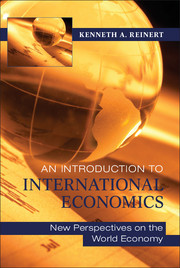Book contents
- Frontmatter
- Summary Contents
- Detailed Contents
- Preface
- Acknowledgments
- Acronyms
- Symbols
- 1 Windows on the World Economy
- I International Trade
- II International Production
- III International Finance
- 13 Accounting Frameworks
- 14 Exchange Rates and Purchasing Power Parity
- 15 Flexible Exchange Rates
- 16 Fixed Exchange Rates
- 17 The International Monetary Fund
- 18 Crises and Responses
- 19 Monetary Unions
- IV International Development
- Glossary
- Index
- References
19 - Monetary Unions
from III - International Finance
- Frontmatter
- Summary Contents
- Detailed Contents
- Preface
- Acknowledgments
- Acronyms
- Symbols
- 1 Windows on the World Economy
- I International Trade
- II International Production
- III International Finance
- 13 Accounting Frameworks
- 14 Exchange Rates and Purchasing Power Parity
- 15 Flexible Exchange Rates
- 16 Fixed Exchange Rates
- 17 The International Monetary Fund
- 18 Crises and Responses
- 19 Monetary Unions
- IV International Development
- Glossary
- Index
- References
Summary
Imagine that you are a finance minister of a medium-sized country with extensive trade and investment relationships with fellow members of a preferential trade agreement (PTA) of the type discussed in Chapter 8. Imagine also that you have responsibility for determining the future exchange rate regime of your country. One option you have is a flexible exchange rate regime (a “clean” or “dirty” float). If you choose this option, however, your country might be buffeted by destabilizing changes in the nominal (and hence real) exchange rate. A second option you have is a fixed exchange rate (or crawling peg). If you choose this option, however, your country might eventually stumble into a balance of payments and currency crisis, as we discussed in Chapter 18. What should you do? There is no easy answer.
There is a third option available to you, one we mentioned briefly in Chapter 8 on PTAs. You and the other finance ministers in the PTA could agree to do away with all the exchange rates among your countries by becoming a monetary union with a common currency. This is not a panacea, because you and your colleagues would still need to decide on the exchange rate regime for the common currency against other major currencies. But at least you can avoid exchange rate instability with your major trade and investment partners. As it turns out, this policy was adopted as a goal by the countries of Western Europe in 1971 and was implemented in 1999. Monetary union has also been a living reality for the Communauté Financière Africaine (CFA) franc zone, a group of African countries with ties to France, and for the rand zone in Southern Africa. In this chapter, we first take up the case of the European Monetary Union (EMU), assessing both its planning and implementation. Next, we assess the EMU in light of the theory of optimum currency areas and discuss its potential adjustment problems and recent crisis. Finally, we briefly consider the cases of the CFA franc zone and the rand zone.
- Type
- Chapter
- Information
- An Introduction to International EconomicsNew Perspectives on the World Economy, pp. 331 - 350Publisher: Cambridge University PressPrint publication year: 2011



